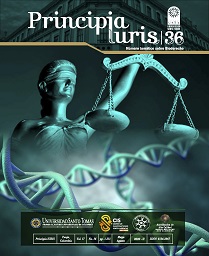Do principios do biodireito europeu: autonomia, dignidade, integridade e vulnerabilidad e
##plugins.themes.bootstrap3.article.main##
Resumo
##plugins.themes.bootstrap3.article.details##
Por medio de esta comunicación certifico que el artículo que estoy presentando para posible publicación en la revista institucional impulsada de la Facultad de Derecho de la Universidad Santo Tomás seccional Tunja, Principia Iuris, es de mi entera autoría, siendo sus contenidos producto de mi directa contribución intelectual.
Todos los datos y referencias a publicaciones hechas están debidamente identificados con su respectiva nota bibliográfica y en las citas que se destacan como tal.
Por todo lo anterior, declaro que el material presentado se encuentra conforme a la legislación aplicable en materia de propiedad intelectual, y por lo tanto, me hago responsable de cualquier reclamación relacionada a esta.
En caso de que el artículo presentado sea publicado, manifiesto que cedo plenamente a la Universidad Santo Tomás seccional Tunja los derechos de reproducción del mismo y accedo a las modificaciones que de forma se requieran para adaptarse a la estética de la revista. Como contraprestación de la presente cesión, declaro mi conformidad de recibir (2) ejemplares del número de la revista en que aparezca mi artículo.
Referências
Engelhardt, T.H. (1986). Toe Foundations of Bioethics. New York: Oxford University Press.
Engelhardt, T.H. (1996). Toe Foundations of Bioethics. New Revised Edition, New York: Oxford University Press.
Ganguilhem, G. (1989). Toe Normal and the Pathological. Boston:
M.I.T. Press.
Haberle, P. (1997). Europaische Rechtskultur. Frankfurt am Main: Suhrkamp.
Jonas, H. (1979). Toe Imperative ofResp onsibility. Chicago: University of Chicago Press.
Jonas, H. (1985). Technik, Medizin und Ethik. Frankfurt: Insel Verlag. Kant, I. (1951). Critique ofJudgement. New York: Hafner Press.
Kant, I. (1997). Groundwork of the Metaphysics ofMorals. Cambridge, UK: University of Cambridge Press.
Kass, L. (1985). Toward a more Natural Science. New York: Toe Free Press.
Kemp, P., Rendtorff, J. & Mattsson, N. (Eds.) (2000). Bioethics and Biolaw, Vol I: Judgement of Life. Copenhagen: Rhodos International Science and Art Publishers & Center for Ethics and Law.
Kemp, P., Rendtorff, J. & Mattsson, N.: (2000). Bioethics and Biolaw, Vol 11: Four Ethical Príncipes. Copenhagen: Rhodos International Science and Art Publishers & Center for Ethics and Law.
Knoppers, B. (1991). Human Dignity and Genetic Heritage, A Study Paper. Ottawa: Law Reform Commission of Canada.
Lenoir, N. and Matthieu, B. (1998). Les normes internationales de la bioéthique. París: PUF.
Lévinas, E. (1979). Totality and Infinity: Leiden: M. Nijhoff.
Merleau-Ponty, M. (1962). Phenomenology of Perception. London: Routlegde.
Rendtorff, J.D. and Kernp, P. (2000). Basic Ethical Principles in European Bioethics and Biolaw, Vol l. Barcelona and Copenhagen: Institut Borja di Bioetica & Centre for Ethics and Law.
Rendtorff, J.D. and Kemp, P. (Ed s.) (2000). Basic Ethical Principles in European Bioethics and Biolaw, Vol 11.: Partner's research. Barcelona and Copenhagen: Institut Borja di Bioetica & Centre for Ethics and Law.
Ricreur, P. (1992). Oneself as Another. Chicago: Toe University of Chicago Press.
Ricreur, P. (1995). Le Juste. París: Editions Esprit.
Ricreur, P. (2000). Prudential Judgement, Deontological Judgement and Reflexive Judgernent in Medica! Ethics. In P. Kernp, J.D. Rendtorff & N.M. Johansen (Eds.), Bioethics and Biolaw, Vol I: Judgement of Life. Copenhagen: Rhodos International Science and Art Publishers & Center for Ethics and Law.
Seve, L. (1994). Pour une critique de la raison bioéthique. París: Odile Jacob.
Valdés, E. (2019). "Towards a New Conception of Biolaw". In Valdés, E. & Lecaros, J.A. Biolaw and Policy in the Twenty First Century: Building Answers for New Questions. Switzerland: Springer.
Valdés, E. & Rendtorff, J.D. (2021) Biolaw, Economics and Sustainable Governance: Global Biojuridical Principles for a Changing World. London: Routledge.
Westra, L. (1994). An Environmental Proposal for an Ethics. Toe Principle of Integrity. Boston: Rowman & Littlefield Publishers.

